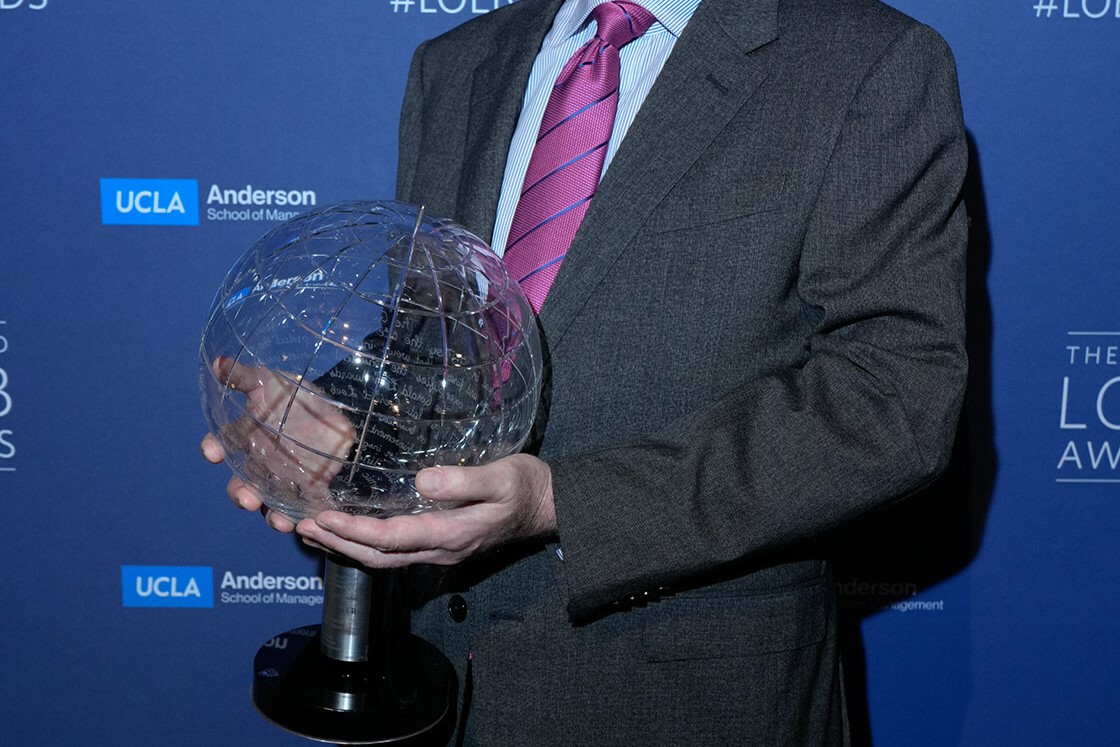Writing wisdom from the 2023 Gerald Loeb Awards for business journalism
The work of these award-winning journalists provides great examples of the craft.

Tom Corfman is a senior consultant with Ragan Consulting Group, where he runs the Build Better Writers program. He loves the three essentials of any story: a compelling headline, an enticing teaser and a captivating lede.
There are three ways to learn to write and the 2023 Gerald Loeb Awards for business journalism offers one of them ― reading.
(The other two are lots of practice and a good editor.)
Business communicators should study all types of writers, including novelists, comedians and even presidents. Our task is to connect with the public. That makes following the work of journalists, especially business reporters, particularly influential.
Gerald Loeb was a founding partner in 1924 of the stock brokerage E.F. Hutton. He was no stranger to reporters; in 1955 Forbes called him “probably the most quoted man on Wall Street.” He knew how to turn a phrase. He established the foundation that bestows the awards in 1957.
As novelist and journalist Annie Proulx said in The Paris Review, “Writing comes from reading, and reading is the finest teacher of how to write.”
Here’s a chance to appreciate the ledes or opening sentences of the best business writing of the past year.
Commentary: Alyssa Rosenberg, Washington Post
Alyssa Rosenberg joined the Washington Post’s Opinions section in 2014 as a pop culture blogger, working her way to becoming a columnist focused on mass culture, parenting and gender. She won for her coverage of last year’s infant formula shortage. Here’s how she begins her takeaway piece, “The baby formula crisis wasn’t a complete disaster. Here’s why.”
Mate a dark comedy about government with a bleak horror movie about the American social safety net and you might get something resembling the U.S. baby formula shortage. The saga features a whistleblower’s report lost in a federal mailroom; decrepit conditions at a factory that was supposed to be making life-sustaining food; and worried, exhausted parents struggling to care for sick, hungry babies.
She directly addresses the reader with a contrast (“dark comedy” and “bleak horror movie”), then continues the movie metaphor with a tight but vivid description of the plot. She wraps it up with the emotion of the crisis.
Feature: Andy Greenberg, Wired
Andy Greenberg is a senior writer for Wired, where in 2019 his coverage of a cyberattack won a Loeb award for international reporting. This year he won in a different category for a story with this headline, teaser and opening:
Inside the Bitcoin Bust That Took Down the Web’s Biggest Child Abuse Site
They thought their payments were untraceable. They couldn’t have been more wrong. The untold story of the case that shredded the myth of Bitcoin’s anonymity.
Early one fall morning in 2017, in a middle-class suburb on the outskirts of Atlanta, Chris Janczewski stood alone inside the doorway of a home he had not been invited to enter.
Moments earlier, armed Homeland Security Investigations agents in ballistic vests had taken up positions around the tidy two-story brick house, banged on the front door, and when a member of the family living there opened it, swarmed inside. Janczewski, an Internal Revenue Service criminal investigator, followed quietly behind. Now he found himself in the entryway, in the eye of a storm of activity, watching the agents search the premises and seize electronic devices.
The headline grabs you with “Bitcoin” and “Child Abuse.” The teaser pulls you in with a promise to go inside for an “untold story.”
In the lede, Janczewski is in a home he “had not been invited to enter,” raising a question for the reader. Isn’t that what investigators do? Greenberg goes back to that question as he ends the anecdote:
Janczewski remembers the gravity of the moment hitting him. This was a high school administrator, a husband and a father of two. Whether he was guilty or innocent, the accusations this team of law enforcement agents were leveling against him—their mere presence in his home—would almost certainly ruin his life.
Greenberg lays out for the reader that this isn’t just a story about technology, It’s also about privacy.
Beat reporting: CoinDesk
A team of eight reporters at CoinDesk won for a package of stories called, “Cracks in the Crypto Empire.” The centerpiece was Ian Allison’s explosive scoop on Nov. 2, 2022, exposing the crumbling foundation beneath Sam Bankman-Fried’s cryptocurrency empire.
Nine days later, Bankman-Fried’s companies were in bankruptcy court – a collapse unprecedented for its combined size and speed. Here’s how Allison starts his story:
Billionaire Sam Bankman-Fried’s cryptocurrency empire is officially broken into two main parts: FTX (his exchange) and Alameda Research (his trading firm), both giants in their respective industries.
But even though they are two separate businesses, the division breaks down in a key place: on Alameda’s balance sheet, according to a private financial document reviewed by CoinDesk. (It is conceivable the document represents just part of Alameda.)
That balance sheet is full of FTX – specifically, the FTT token issued by the exchange that grants holders a discount on trading fees on its marketplace. While there is nothing per se untoward or wrong about that, it shows Bankman-Fried’s trading giant Alameda rests on a foundation largely made up of a coin that a sister company invented, not an independent asset like a fiat currency or another crypto. The situation adds to evidence that the ties between FTX and Alameda are unusually close.
It’s a competent job handling a complex topic, included here because of the superlative reporting and the size of the scoop. It walks the readers methodically through the apparent conflict, using a “private financial document.”
The story hedges where necessary: The financials may be partial and there’s “nothing per se untoward or wrong.” Then it draws a conclusion about the “unusually close” ties between two companies that were seemingly invincible at the time.
Explanatory reporting: Los Angeles Times
The team of seven journalists at the Times led by Climate Columnist Sammy Roth won for the series “Repowering the West.”
The teaser to that headline is, “Energy-hungry cities are reshaping the landscape, again.” Here’s the introduction to the series:
Over the last century, cities such as Los Angeles, Phoenix and Las Vegas transformed the American West by building coal plants, hydropower dams and nuclear reactors to fuel their stunning growth. Now those cities are on the verge of doing it again, only this time with solar and wind farms, long-distance power lines and open-pit lithium mines.
Clean energy projects are badly needed to fight climate change — but they can fuel intense opposition in the communities where they’re built. We’re spotlighting examples of that tension across the West, with an eye toward finding solutions.
This is a big-picture lede, offering the reader a glimpse of the history of power generation. The cities are synonymous with booming urban growth. The last word of the teaser, “again,” hints at that history.
Then the opening turns to the battles that are the key theme of the series.
Investigative reporting: BuzzFeed News
A team of four journalists with BuzzFeed News won for a yearlong investigation with the alliterative headline, “Profit, Pain and Private Equity.” The story examined investment firm KKR’s purchase of one of the nation’s largest group home operators.
Here’s how the team, led by Senior Investigative Reporter Kendall Taggart, starts the story:
Over five decades, the private equity giant KKR became famous — or infamous, depending on the observer — for a particular playbook. It acquired iconic companies such as RJR Nabisco, Duracell, and Toys R Us, loaded them up with debt, and sold them off.
In 2019, KKR took on a responsibility that was very different from selling cookies or batteries: caring for thousands of people with severe intellectual or developmental disabilities, some of whom cannot speak, wash, or feed themselves.
The first sentence introduces KKR, a name probably not familiar to readers of a news site once known for listicles. Then the story is summed up with a contrast ― going from selling cookies or batteries to housing people who cannot care for themselves. From that you can tell this $1.3 billion deal is not going to end well for residents.
About Loeb
The awards are managed by the UCLA Anderson School of Management. Other winners and their categories: “The Collapse of FTX” by Reuters (Breaking News); “The Amazon, Undone,” by The Washington Post (International); “Legal Weed, Broken Promises,” also by the Times (Local); and “Diagnosis: Debt,” by KFF Health News, NPR and CBS News (Personal Finance and Consumer Reporting).
Awards are also handed out for Audio, Video and Visual Storytelling.
In “The Battle for Investment Survival,” Loeb, who died in 1974, wrote, “A little horse sense is far more useful than a lot of theory.”
Follow RCG on LinkedIn and subscribe to our weekly newsletter here.






